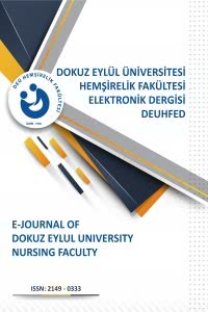An Analysis of Trends in Internet Searches about Dementia in Turkey
İnternet, Demans, Alzheimer Hastalığı
An Analysis of Trends in Internet Searches about Dementia in Turkey
Internet, Dementia, Alzheimer’s Disease,
___
- 1. Turkish Statistical Institute (TUIK). Elderly Statistics [online]. 2016. URL: http://www.turkstat.gov.tr/PreHaberBultenleri.do?id=21520. 17.03.2016
- 2. World Health Organization (WHO). Aging and Health [online]. 2015. URL: http://www.who.int/mediacentre/factsheets/fs404/en/. 06.09.2017
- 3. Arslantaş D, Özbabalık D, Metintaş S, Özkan S, Kalyoncu C, Özdemir G ve ark. Prevalence of dementia and associated risk factors in Middle Anatolia, Turkey. Journal of Clinical Neuroscience 2009;16(11):1455-1459.
- 4. Keskinoğlu P, Yaka E, Uçku R, Yener G, Kurt P. Prevalence and risk factors of dementia among community dwelling elderly people in İzmir, Turkey. Turkish Journal of Geriatrics 2013;16(2):135-141.
- 5. Akpınar B, Küçükgüçlü Ö, Yener G. Effects of gender on burden among caregivers of Alzheimer's patients. Journal of nursing scholarship 2011;43(3):248-254.
- 6. Tekin N, Dişçigil G, Altunbaş E. Care of dementia patients, social perspective, behavioral and information resources [Demans hastalarının bakımı, toplumsal bakış açısı, davranış ve bilgi kaynakları]. Turkish Journal of Geriatrics 2011;14(1):35-39.
- 7. Turkish Statistical Institute (TUIK). Families Statistics [online]. 2017. URL: http://www.tuik.gov.tr/HbPrint.do?id=24646. 08.11.2017
- 8. Magnusson L, Hanson E, Borg M A. Literature review study of information and communication technology as a support for frail older people living at home and their family carers. Technology and Disability 2004;16:223-235.
- 9. Tonta Y. Electronic Publishing and Electronic Information Sources [Elektronik Yayıncılık ve Elektronik Bilgi Kaynakları] [online]. 2002. URL: http://yunus.hacettepe.edu.tr/~tonta/courses/fall2002/kut655/02-e-yayincilik-e-bilgi-kaynaklari.pdf. 08.11.2017
- 10. Fox S, Rainie L. The online health care revolution: How the Web helps Americans take better care of themselves”, Health Report, The Pew Internet and American Life Project [online]. 2000. URL: http://www.pewinternet.org/~/media/Files/Reports/2000/PIP_Health_Report.pdf 08.11.2017
- 11. Bass S. How will internet use affect the patient? A review of computer network and closed internet-based system studies and the implications in understanding how the use of the internet affects patient populations. Journal of Health Psychology 2003;8(1):25-38.
- 12. Høybye M T, Johansen C, Tjornhoj-Thomsen T. Online interaction. Effects of storytelling in an internet breast cancer support group. Psycho-Oncology 2005;14(3):211-220.
- 13. Fogel J, Albert S M, Schnabel F, Ditkoff B A, Neugut, A I. Internet use and social support in women with breast cancer. Health Psychology 2002;21(4):398-404.
- 14. Satterlund M, McCaul K, Sandgren A. Information gathering over time by breast cancer patients. Journal of Medical Internet Research 2003;5(3):e15.
- 15. Connell C M, Gallant M P. Spouse caregivers’ attitudes toward obtaining a diagnosis of a dementing illness. Journal of American Geriatrics Society 1996;44(8):1003-1009.
- 16. Akpınar B, Gönen S, Küçükgüçlü Ö. Examining the content of Turkish web pages related to dementia syndrome [Demans sendromu ile ilgili Türkçe web sayfalarının içeriğinin incelenmesi]. DEUHFED 2012;5(4):150-156.
- ISSN: 2149-0333
- Yayın Aralığı: 4
- Başlangıç: 2008
- Yayıncı: Dokuz Eylül Üniversitesi Hemşirelik Fakültesi
An Analysis of Trends in Internet Searches about Dementia in Turkey
BURCU AKPINAR SÖYLEMEZ, ÖZLEM KÜÇÜKGÜÇLÜ
SİNEM YALNIZOĞLU ÇAKA, Nursan ÇINAR
Arzu ÖZYÜREK, Meltem KÜRTÜNCÜ, Esin SEZGİN, Aylin KURT
Türkiye’de Demans ile İlgili İnternet Taramalarının Trend Analizi
Burcu AKPINAR SÖYLEMEZ, Özlem KÜÇÜKGÜÇLÜ
Multipl Sklerozlu Hastaların Tedavi Yönetimi ve Hemşirelik Yaklaşımları
Öznur ERBAY, Öznur USTA YEŞİLBALKAN, Ayfer KARADAKOVAN
Hemşirelik Öğrencilerinin Sosyal, Duygusal Yalnızlık Düzeyleri ve Yeme Davranışlarının İncelemesi
